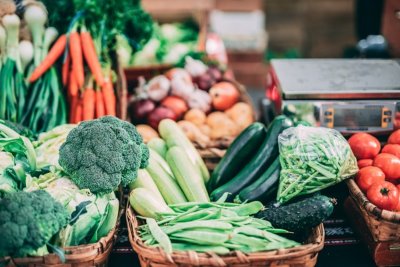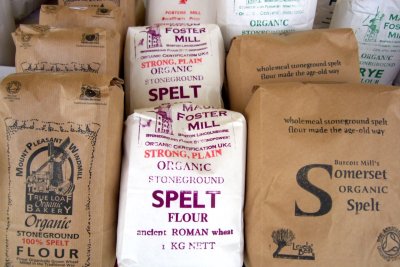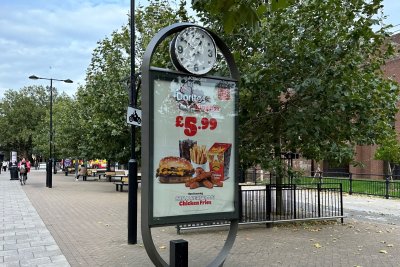In June, the Government launched its ‘once-in-a-generation’ National Food Strategy, led by Defra non-executive director Henry Dimbleby. Sustain welcomed the government’s commitment to a fundamental overhaul of the food system and Michael Gove’s statement that “the time is right for us to look afresh at our food system to ensure everyone has access to high-quality British food and our environment is protected for future generations”.
Sustain has joined others in declaring a climate and nature emergency. We are committing to catalysing the shared voice of our powerful alliance to campaign for the economic, policy and legislative conditions for climate and nature friendly food, farming and fishing to thrive. We will also do more to get our own house in order, ensuring that we and our movement ‘walk our talk’ on climate and nature.
The Times newspaper carries a story today about PM-hopeful Boris Johnson's apparent ambition to secure a partial trade deal with the US ahead of the 31 October Brexit deadline. This comes on the back of his apparent support for British food standards as part of a hustings event last week. The devil, as ever, is in the detail. He reportedly said this: "I don’t want us to do any deal with the US which in anyway jeopardises our animal welfare standards or our food hygiene standards. The quality of food in this country must be protected and if anything we should be insisting that if the Americans want to trade with us they should be obeying our standards." But 'animal welfare and food hygiene' does not actually cover food standards, neither does this include environment, climate change, biodiversity protection, nutrition, food quality, labelling, marketing, antibiotics stewardship, pesticides, nor a whole host of production standards. For a refresher on the food-, farming- and fish-related things we're keen to avoid in a US-UK trade deal, click here.
As part of our 20th birthday celebrations, we held a memorable reception in parliament making the National Food Strategy our focus. We were delighted that Minister for Food and Animal Welfare David Rutley MP spoke at the event, along with EFRA Committee Chair Neil Parish MP, Kerry McCarthy MP, Shadow Environment Secretary Sue Hayman MP and Deputy Leader of the Labour Party Tom Watson, who told our audience that "Finding Sustain has been the joy of my life”. Mine too, frankly.
Happy 20th birthday to the Sustain alliance and all that we achieve together!
Kath Dalmeny
Chief Executive, Sustain: the alliance for better food and farming
Food and Farming (Agriculture Bill)
The Agriculture Bill remains stalled but Sustain continues to engage and promote key amendments - on environment, health, workers and supply chain fairness. PM Candidate Boris Johnson responded to NFU concerns on a no deal that “The Agriculture Bill that is currently before Parliament makes a number of beneficial improvements, but I am keen to work with the NFU to look at what other changes we can introduce to boost standards, enhance consumer safety and encourage domestic production.” Is this a sign of the emphasis changing more towards production and less on public goods? Jeremy Hunt MP made similar comments as well as promising “a No Deal Relief Programme” of “a £6 billion fund for the fishing and farming sectors” (which trade specialists later pointed out isn’t strictly legal under WTO terms).
Meanwhile the Welsh Government has just published revised proposals for farm support - taking account of responses to their first consultation - proposing paying active farmers only a Sustainable Farming Payment, through a single scheme instead of the two-tiers but still based on delivering public outcomes and using an on-Farm Sustainability Review.
The English post Brexit scheme - Environmental land Management scheme (ELMS) development has been a bit delayed due to restructuring and complications with commissioning the ‘tests and trials’. I continue to sit on the ELMS Tests and Trials group advising on development. Sustain's Vicki Hird continues to sit on the ELMS Tests and Trials group, advising on development. A recent National Audit Office report was critical of how Defra is managing the process but there is little doubt these huge changes will be complicated given the need to involve all stakeholders and, rightly, deliver on multiple objectives.
Given the results of the survey and report Sustain helped to fund called Putting our eggs in a better basket: A survey of English farmers’ opinions on agriculture policy”- it is clear that after Brexit we need effective public support for farmers in delivering environmental and social outcomes as well as more stringent control of supply chains to support decent farming livelihoods and sufficient income returning to farms to enable the environmental and other improvements that are now a priority. (Vicki Hird)
Fish (Fisheries Bill)
Sustainable fishing and collaboration will be more important than ever after Brexit. We heard this week that the cod populations in the North Sea have dropped dramatically, leading to scientists recommending cutting catches by 60%. Sustain alliance member WWF’s Helen McLachlan said, on Radio 4’s Farming Today, that we must monitor fishing vessels much better, with cameras on vessels. Sustain backs this call – better data would help the UK market its fish as sustainable and give domestic boats a commercial advantage.
New Fisheries Minister Robert Goodwill has responded to concerns in the fishing industry about attracting EU workers after Brexit, suggesting on a visit to Grimsby that workers will be able to apply to work through a ‘Leave to Remain’ system – and that whatever the outcome of Brexit, EU migrants will be able to come to live and work in the UK. Find out more (Ruth Westcott)
Food Standards (Trade Bill)
A No Deal Brexit is firmly back on the agenda, after a brief lull, with both candidates for the Conservative leadership committing to leaving on 31 October, with or without a deal. However Boris Johnson MP’s claim that UK businesses could continue to trade tariff-free with Europe under an obscure trading law known as Gatt 24 has been comprehensively dismissed by Roberto Azevedo, the director general of the WTO. The mechanism can only be invoked if both parties have reached an agreement on a future trade deal. If you need a refresher on why No Deal would be disastrous for food and farming, read our FAQs. (Orla Delargy)
Net zero carbon emissions and international trade
David Lawrence, from Sustain ally Trade Justice Now, has written a piece on why Theresa May's 'Net Zero' carbon emission commitment will not survive her successor's trade policy. In the piece he argues that the "independent trade" policies supported by her likely successors include a key mechanism to stop environmental efforts. You can read the piece here.
And in other food, farming and trade news...
A no deal Brexit would be ‘catastrophic’ and could lead to food that is illegal in the UK being imported into our markets, the NFU has warned.
In an interview with Sky News, NFU President Minette Batters counselled against undermining food standards and farmers’ livelihoods.
China continues to restrict the sale of US pork due to safety concerns
An opinion piece that argues US pork producers are missing out on capitalising on China’s swine flu crisis, not because of the current trade war tariffs but because of their reliance on ractopamine.
Channel 4 exposé questions the safety of American chicken
An undercover investigation by Channel 4’s Dispatches programme last month revealed dangerous practices at a US chicken factory and raised fears of low standard, possibly contaminated meat being part of a future US/UK trade deal.
Supermarkets say no-deal Brexit would lead to rotting Christmas dinners
Sainsbury's, Tesco and Asda warn that a 'no-deal' Brexit on 31 October would be 'as bad as it gets' with fresh food rotting in ports in build up to Christmas.
US Ambassador confirms chlorine chicken and NHS are likely part of future trade deal
UK shoppers should be given ‘a choice’ to buy American products like chlorinated chicken as part of a trade deal with the US, US Ambassador Woody Johnson said at the beginning of June, ahead of a visit to the UK by US President Donald Trump.
Other recent Brexit-related news
No deal Brexit and food supplies for vulnerable people
Sustain’s chief executive Kath Dalmeny has been continuing to raise with government strong concerns about what would happen to food supplies for vulnerable people in a ‘no deal’ Brexit. We are increasingly concerned that government and industry have overlooked the possibility that:
- For the 3 million food parcels given out to people in food crisis via food banks each year with food donated by individuals, food donations could dry up if food prices rise or supply is disrupted. [Trussell Trust and Independent Food Aid network figures for food parcels given out last year by food banks to people in crisis]
- For the 46.5 million meals served by frontline charities – such as homeless and domestic violence shelters, food surplus donations from supermarkets and wholesalers dry up, if food supplies are disrupted and/or there is a surge in people stockpiling. [FareShare figure for meals supplied from food surplus]
After several months of attempting to gain government attention, via personal, parliamentary and media approaches, Defra has now picked up on these concerns. At the beginning of July, Kath chaired a very positive meeting with Defra, Cabinet Office, HM Treasury, MHCLG and DWP, involving all of the main UK surplus food redistribution and food aid coordination bodies. We are now developing further work to address the specific issues raised.
Brexit: We stand at a cross-roads. When the UK leaves the European Union, will our leaders uphold good standards for our food, farming, fishing and trade deals? And will they agree a sensible deal with the EU? We need to make sure that they do!



